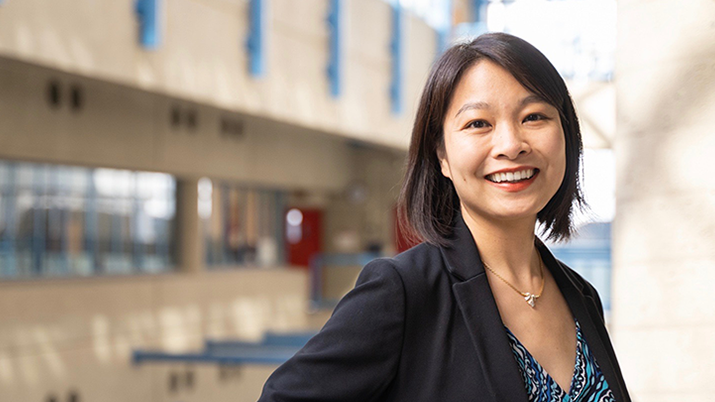

Dr. Liisa Galea at the Djavad Mowafaghian Centre for Brain Health.
The Research Excellence Clusters program at the University of British Columbia continues to support research across disciplines, linking the neuroscience community with experts across campus to ask big questions and solve big problems.
In 2019, the program funded clusters lead by UBC psychology researchers. The Language Sciences Initiative (PI: Dr. Janet Werker) received another year of funding and a new cluster, the Women’s Health Research Cluster (PI: Dr. Liisa Galea) has begun working toward improving women’s experience in the healthcare system by understanding the unique physiological and social challenges that affect how women experience health and disease.
WOMEN’S HEALTH IN FOCUS
To begin, Dr. Galea and colleagues have hired Ama Kyeremeh, who completed her Master’s degree in Public Health under the supervision of Dr. Angela Kaida at Simon Fraser University, in the role of cluster coordinator. Kyeremeh, who came to Vancouver from Toronto, has a particular interest in women’s health, having spent her graduate practicum working with the Canadian HIV Women’s Sexual and Reproductive Health Cohort Study (CHIWOS). With the CHIWOS study, Kyeremeh explored the role of AIDS Service Organizations (ASOs) in addressing the social and health care needs of women living with HIV in British Columbia; using CHIWOS data, she investigated the patterns of service use of ASOs by women living with HIV across a range of available support networks in BC.


Ama Kyeremeh, Women’s Health Research Cluster Coordinator, at the Djavad Mowafaghian Centre for Brain Health.
“Working with CHIWOS gave me a unique perspective on women’s health research,” said Kyeremeh. “There is such a broad scope of women’s research happening locally, and it’s important to me to get that knowledge out into the community and to rally around the researchers conducting important sex-specific research at UBC and its related centres, including the Djavad Mowafaghian Centre for Brain Health, Women’s Health Research Institute, and beyond.”
“It’s well past time for an interdisciplinary, and integrative women’s health research program,” said Kyeremeh.
“Through the work of this cluster, we have an opportunity to provide the research and clinical communities with invaluable information that will make help make women healthier.”
“It’s so important to have researchers focus on understanding women’s health issues,” said Dr. Liisa Galea. “In general, women experience poorer health from missed diagnoses, minimized symptoms, greater burdens of specific diseases, and poorly targeted treatment than men. Through the work of this cluster, we have an opportunity to provide the research and clinical communities with invaluable information that will make help make women healthier.”
CONNECT WITH THE WOMEN’S HEALTH RESEARCH CLUSTER
The cluster now has an active Twitter account (@ResearchonWH) that you can follow for updates, and they are working to launch their website in the near future. If you are a faculty member or student who is interested in connecting with the cluster to collaborate, email ama.kyeremeh@ubc.ca.
ABOUT RESEARCH EXCELLENCE CLUSTERS AT UBC
UBC Research Excellence Clusters bring together researchers across a wide range of faculties and departments at the University of British Columbia to collaborate on and advance a particular area of research. Launched in 2016, the UBC Research Excellence Clusters program is supported by the Office of Vice-President, Academic and Provost and the Vice-President, Research and Innovation, with financial contributions from the UBC Excellence Fund.
This article was originally posted on the Djavad Mowafaghian Centre for Brain Health’s website.


